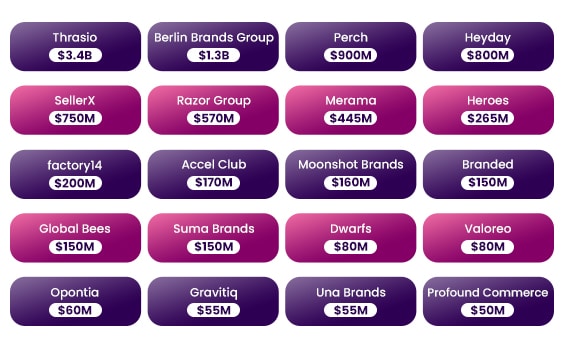There has been a whirlwind of activity around aggregators, in particular around Amazon FBA brands, over the past couple of years. The pandemic leading to more and more e-commerce activity has placed somewhat of a spotlight on the growing e-commerce sector and a number of aggregators have raised a lot of money, billions, in fact, to buy up Amazon FBA brands.
When you think about the fact that more than half of US Adults go to Amazon to research products to purchase, and the fact that 56% of sales on Amazon are third-party sellers, it is quite a compelling opportunity. Beyond that, in a 2019 report by Marketplace Pulse, 78% of Amazon searches were unbranded!!
What are these aggregators all about?
For the most part, their business model is about finding quality Amazon FBA businesses with the opportunity to maintain and increase their growth rate and annual revenue. This future growth can come in many forms. This includes, launching brands on other marketplaces, continued organic growth, cross-marketing through other acquired Amazon seller accounts, improved supply chain management efficiencies, and so on.
Now, you might think to yourself;
“Why would I sell when I can just continue to grow it myself? Certainly, I can grow it just as well, if not better than they can because they don’t know my brand.”
So, let’s take a look at this very valid thought.
You most certainly can continue to grow and build your brand yourself but there is always an opportunity cost that comes with this. Depending on many factors; the stage of your business, increasing competition, your personal situation, moving to retirement, etc. it really is a personal decision but you should weigh the pros and cons and make the decision that is best for you at that time.
Sales volume plays an integral part in how often you appear and rank in search results. Gaining traction not only takes time and patience but, in many cases, can take a significant investment in dollars to achieve.
Aggregators have well-defined processes and have either developed tools in-house or are using a variety of third-party software tools for various parts of their business from inventory management, content, advertising optimization, and so on.
Beyond that, many of these aggregators recognize that you have done a fine job in building a brand and generating great sales and will likely want to keep you involved going forward. So, another question to ask yourself is whether or not you want to be a part of something bigger.
Eventually, these well-funded brands will continue to learn and grow and become better and better at scaling growth more cost-effectively and will most certainly have more cash and people resources to do so.
So, keep in mind that you might need to up your game in order to compete as the market becomes more competitive. There are various tools and software applications that can truly help you and in order to not become inundated with managing tools, you might want to automate as many of your manual processes as possible.
Why do they want to buy my e-commerce business? What's the value to them?
“Why do they want to buy my e-commerce business? What’s the value to them?” are good questions to ask.
Simply put they are looking to dominate certain categories and are buying businesses in those categories as well as adjacent categories for cross-selling and marketing opportunities.
How can I remain competitive and make better-informed decisions on my e-commerce business?
Keeping in mind all of the points above, the key in growing and managing your e-commerce brand or Amazon FBA business means having time to follow you to focus on the products you sell and more time to think about the strategic growth of your business.
Whether or not you pursue a sale of your e-commerce business, you need
to create space to focus on the strategy of your business and a good way to do that is to leverage technologies that help you automate processes and manually time-consuming tasks.
So, it seems that leveraging technologies in order to free up your time from mundane and manually time-consuming tasks of data entry and keyword research is the way to really grow and scale your business and there are many tools and platforms out there to help you manage various aspects of your business. Here are some free tools you can use from Trellis:
You can use these free tools to gain insights and better understand your business to ensure you are optimizing and maximizing the true value.
Who are these aggregators?
There are many aggregators today and below are a couple of links to Amazon FBA Acquirers that others have already prepared. As a visual, here are 20 Amazon FBA Aggregators that have raised more than $50M in Private Equity and Venture Capital funding;

For more complete lists of Amazon Aggregators globally, here are a couple of sites to visit:
My business sells direct using Shopify, are there aggregators for non-Amazon e-commerce business? (Shopify, WooCommerce, Magento, etc)
Certainly, there are but the most activity to date has been aggregators focused on Amazon brands. While the majority of Shopify stores sell direct and on social channels as opposed to through Amazon, there are still about 30% of Shopify stores that do sell through Amazon.
Now, if you factor in that Amazon is the leading online marketplace in the US, there is a case to be made for aggregators to acquire brands that operate solely on the Shopify platform and launch them on Amazon as well.
In a future post, we will explore some of the Amazon FBA aggregators in more detail.



